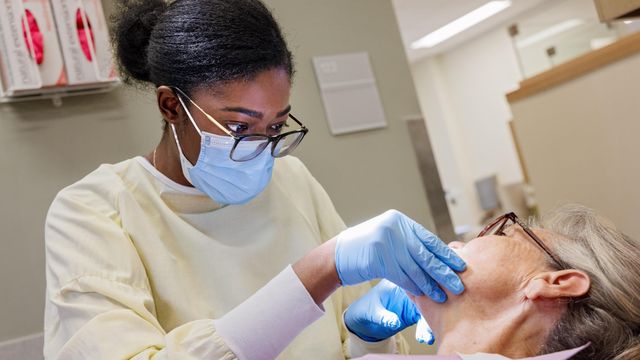Rural health care a priority for ECU health sciences grads
This article was written for our sponsor, East Carolina University
The college and schools on East Carolina University’s Health Sciences campus share a singular mission: to give the next generation of healthcare professionals the education and training they need to provide care to all North Carolinians.
Of special interest are the state’s rural communities, where health care can be scarce and patients must sometimes travel long distances to see a provider. To help break this health care barrier, ECU has placed a special focus on innovation in delivering education and patient care to the underserved, as well as rural health-focused courses, field work, research and programs that emphasize the need for better access across the state.
Such innovation is taking place across North Carolina, from nursing students caring for dementia patients in the East to the rotations dental students complete at Community Service Learning Centers (CSLC) statewide. Over the past four years, the School of Dental Medicine has won two national awards for its innovative model of education and patient care – one for its CSLCs and one for its commitment to advancing its social mission and exploring ways to better serve rural parts of the state.
In the College of Allied Health Sciences, students receive valuable learning experiences related to providing care in rural settings. Rural health care is at the heart of the school’s mission.
“Our students learn about the importance of transforming health care, promoting wellness and increasing access to health care for the people of eastern North Carolina,” said Leigh Cellucci, associate dean for academic affairs. “Students spend time with patients and clients from rural areas. They learn firsthand the importance of access to health care.”
ECU’s College of Allied Health Sciences is North Carolina’s largest. In fall 2022, it had an enrollment of 1,481 students and boasts more than 10,000 alumni. Nearly 75% of its graduates remain in North Carolina to work, with half of those working or living in eastern North Carolina.
The school offers several clinics that see patients from rural areas of North Carolina, including the Speech Language and Hearing Clinic, the student-run Physical Therapy and Occupational Therapy Clinics, and the Navigate Counseling Clinic. Other initiatives created in the college address health care challenges for special populations.
Rural health is an essential concept across the school’s departments as they prepare students for careers wherever they are needed. ECU’s allied health students travel by van to provide free health screenings and other services to patients in underserved communities.
“It is of critical importance that small hospitals in eastern North Carolina employ highly qualified clinical laboratory science professionals to work in their labs to provide better health care,” said Dr. Guyla Evans, chair of the Department of Clinical Laboratory Science. “The people of eastern North Carolina deserve this, and we accomplish this.”
Preparing students through curriculum and experience will enable them to better understand the importance of access in improving health care services, added Dr. Paul Bell, professor in the Department of Health Services and Information Management.
“Healthcare administrators serve an important supportive role to ensure better health for the people who live in our rural communities, and our understanding that access to primary care, particularly preventive care, will improve our health is central to our mission of transforming health care delivery,” he said.
At the ECU Brody School of Medicine, students learn about the many obstacles that patients in under-resourced communities must overcome to receive needed health care.
“The majority of counties in this state are rural, so if we are going to proclaim to improve the health status of North Carolina, we have to be prepared to do so in a rural environment,” said Dr. Matthew A. Rushing, family medicine clinical assistant professor and assistant residency director.
The Brody School of Medicine can claim 12% of graduates practicing in rural areas, compared to a national median of 4%, according to the Association of American Medical Colleges Mission Management Tool. This statistic places them over the 90th percentile in that metric.
Brody also has the highest retention of graduates practicing in rural North Carolina counties five years after graduation compared to other medical schools in the state, notes the Sheps Center Report on 2022 Outcomes of NC Medical School Graduates.
Training for service in rural areas starts early for Brody students. First-year students, for example, see a series of standardized patients whose stories are set in the rural communities of eastern North Carolina as they learn to interview new patients. Second-year students examine how to better address the lack of access from hospitals closing, as well as private practices, and how that impacts preventive medicine and population health. Brody’s Family Medicine Clerkship places third- and fourth-year students in community clinics where they see firsthand how rural physicians care for patients.
The Rural Health Disparities Lab, housed in ECU’s College of Health & Human Performance, collaborates with community members and organizations on research projects and evidence-based programs that address health disparities in eastern North Carolina. Current projects are:
- Looking at ways to inspire the interest of rural underrepresented racial and ethnically diverse undergraduate students in maternal and child health-related career paths;
- Building the infrastructure between co-located dental practices and federally qualified health centers to facilitate HPV vaccination uptake;
- Evaluating and expanding access to a transportation program called Project TRIP, which aims to increase access to health care and improve the health and well-being of disadvantaged rural adults in North Carolina.
Throughout their medical education, ECU students are also given the tools and training so that they can be part of medical progress in access. Students who attend College of Allied Health Sciences and Brody come from all corners and pockets of North Carolina and beyond. ECU is striving to ensure that each and all of those communities have great health care options.
This article was written for our sponsor, East Carolina University











